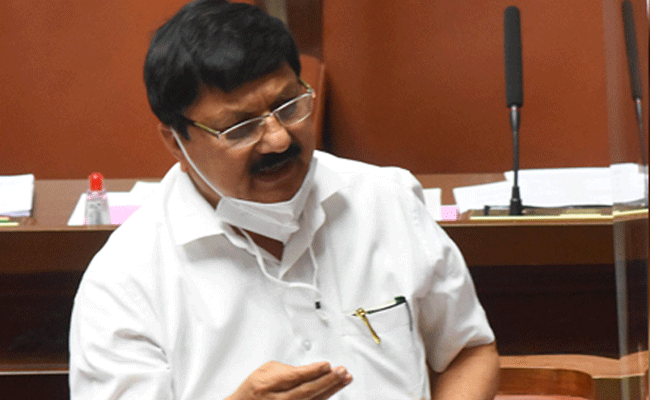Bengaluru(PTI): In view of alarming rise in COVID-19 cases in the city, the Karnataka government on Tuesday decided to increase tests in Bengaluru to 1.3 lakh daily.
Speeding up booster doses to frontline workers and authorising the district authorities to decide on shutting down or running schools if infections increase among students were among the major decisions taken by the government.
"In view of the rising COVID cases, Karnataka decided to increase tests from 1.1 lakh per day to 1.3 lakh per day or above in Bengaluru.Those in home isolation should be under observation. We should be careful till they fully recover because 95 per cent people today are under home isolation," state Home Minister Araga Jnanendra briefed reporters after a virtual meeting chaired by Chief Minister Basavaraj Bommai on the prevailing COVID situation in the state.
According to health officials, the state is conducting about 1.5 lakh daily tests in entire Karnataka including 1.25 lakh RT-PCR tests. However, Bengaluru alone is contributing about 80 to 90 per cent of cases daily, compelling government to come out with Bengauru specific rules, they added.
Jnanendra said the government has decided to speed up giving the booster dose to the frontline workers such as health workers and police.
Regarding school children, the home minister said the infection is increasing among children.
"Cases are increasing in hostels and residential schools. So, the deputy commissioners and the local administration have been delegated powers whether to run or shut down schools," Jnanendra said.
It was also decided in the meeting that more medicines should be procured and stocked, so that there is no shortage of medicines in treating children. Further, all the hospitals at Taluk and district level should have special wards and beds for children, the minister said, adding that the education and health department officials were asked to conduct a general health checkup in schools every fortnight.
In the meeting, it was decided to decentralise markets to avoid congestion, educating people to wear masks and maintain social distancing.
The police have been directed to prevent protests and demonstrations and ensure that people do not congregate, Jnanendra said. He added that police should not allow such events to take place.
A statement issued by the office of the Chief Minister said that instructions have been issued for monitoring the health of those home quarantined and timely distribution of health kits for them.
Bommai wanted the officials to strengthen the triaging to ascertain whether an infected person needs hospitalisation or not immediately on getting the test report, the statement read.
"It was decided to utilise the services of House Surgeons and Final Year Nursing students in the Home Isolation and Triaging process. Further 27 Covid Care Centres will be started in Bengaluru immediately," it said.
In view of Vaikuntha Ekadashi and Makara Sankranti festivals, it was decided that religious events can be allowed by strictly adhering to COVID norms, the Home Minister said.
He added that in case violation of COVID guidelines occur in temples then cases will be registered.
According to Jnanendra, a few other decisions will be taken after a virtual meeting with Prime Minister Narendra Modi on January 13.
Besides Bommai and Jnanendra, Health Minister Dr K Sudhakar and Primary, Secondary Education Minister B C Nagesh and senior officials attended the virtual meeting.
Let the Truth be known. If you read VB and like VB, please be a VB Supporter and Help us deliver the Truth to one and all.
Panaji (PTI): As part of a crackdown against tourist establishments violating laws and safety norms in the aftermath of the Arpora fire tragedy, Goa authorities on Saturday sealed a renowned club at Vagator and revoked the fire department NOC of another club.
Cafe CO2 Goa, located on a cliff overlooking the Arabian Sea at Vagator beach in North Goa, was sealed. The move came two days after Goya Club, also in Vagator, was shut down for alleged violations of rules.
Elsewhere, campaigning for local body polls, AAP leader Arvind Kejriwal said the fire incident at Birch by Romeo Lane nightclub at Arpora, which claimed 25 lives on December 6, happened because the BJP government in the state was corrupt.
An inspection of Cafe CO2 Goa by a state government-appointed team revealed that the establishment, with a seating capacity of 250, did not possess a no-objection certificate (NOC) of the Fire and Emergency Services Department. The club, which sits atop Ozrant Cliff, also did not have structural stability, the team found.
The Fire and Emergency Services on Saturday also revoked the NOC issued to Diaz Pool Club and Bar at Anjuna as the fire extinguishers installed in the establishment were found to be inadequate, said divisional fire officer Shripad Gawas.
A notice was issued to Nitin Wadhwa, the partner of the club, he said in the order.
Campaigning at Chimbel village near Panaji in support of his party's Zilla Panchayat election candidate, Aam Aadmi Party leader Kejriwal said the nightclub fire at Arpora happened because of the "corruption of the Pramod Sawant-led state government."
"Why this fire incident happened? I read in the newspapers that the nightclub had no occupancy certificate, no building licence, no excise licence, no construction licence or trade licence. The entire club was illegal but still it was going on," he said.
"How could it go on? Couldn't Pramod Sawant or anyone else see it? I was told that hafta (bribe) was being paid," the former Delhi chief minister said.
A person can not work without bribing officials in the coastal state, Kejriwal said, alleging that officers, MLAs and even ministers are accepting bribes.





